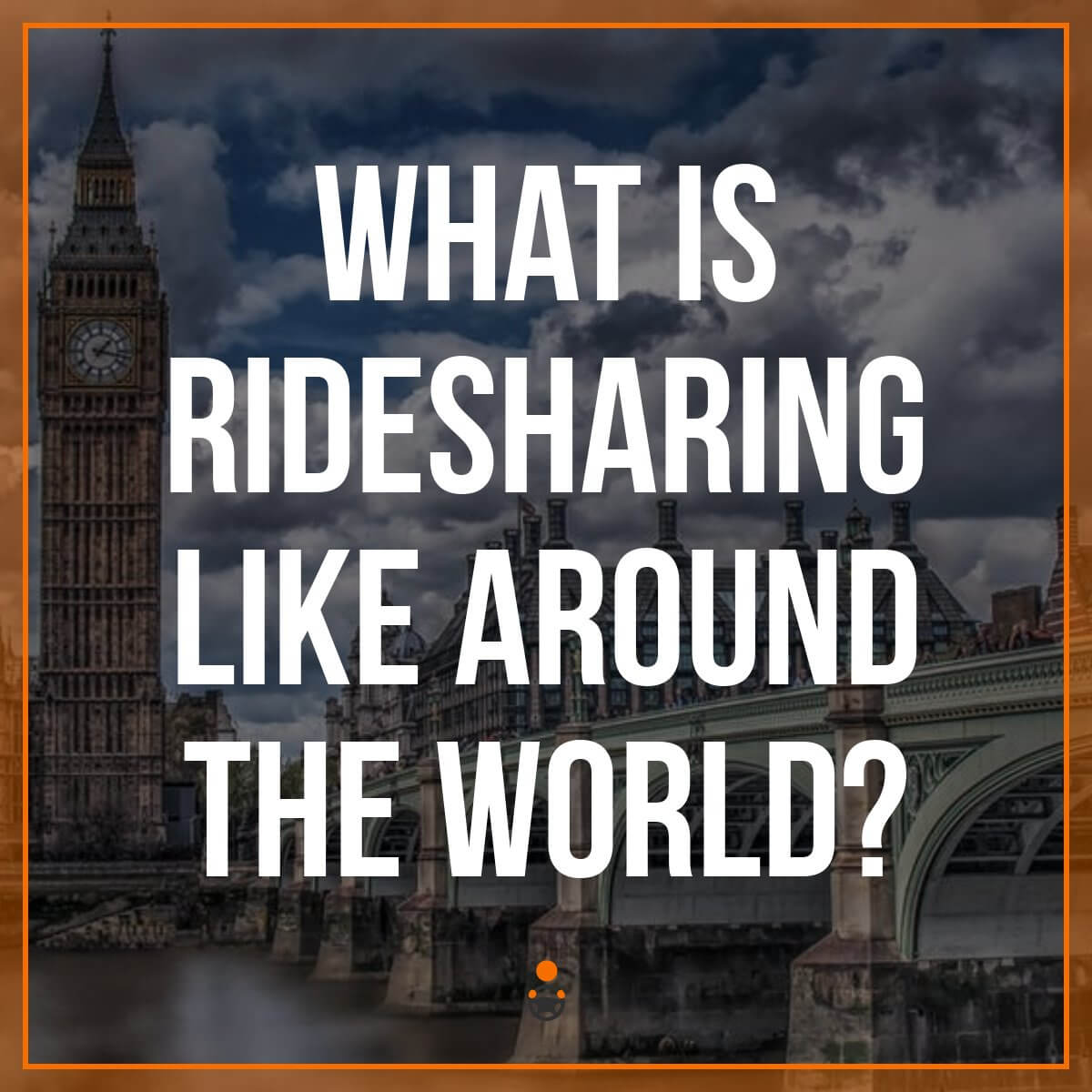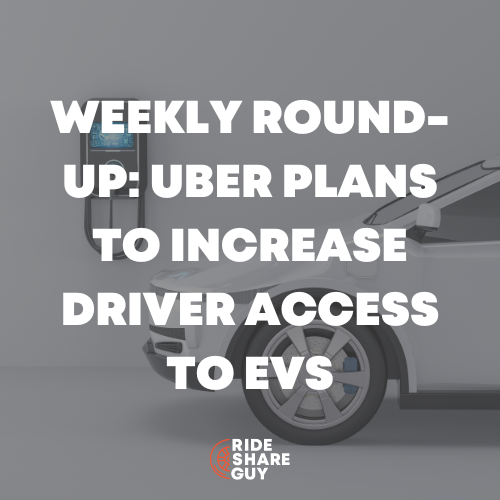Here on RSG, we typically cover Uber and Lyft in the United States – but what is ridesharing like around the world? Senior RSG contributor John Ince covers Uber around the world, plus how drivers are making extra money with Cargo and more in this week’s round up.

Where Uber Is Winning The World, And Where It Has Lost [Forbes]
Sum and Substance: Three years ago, Uber was marching towards global domination. In 2018, the new Uber is picking and choosing its battles. In some markets, that has meant a complete departure after Uber merged its business with homegrown rivals in Russia, China and Southeast Asia. In the Middle East, Uber is reportedly looking to take the opposite approach and acquire challenger Careem outright.
Forbes breaks down where Uber is facing challenges versus opportunities around the globe: Uber overcame a few tough regulatory hurdles after a rough start in France and the United Kingdom, but the battle for other markets is far from over. Uber has vowed to do a “reset” in Germany, where it operates a very limited service in Berlin. Spanish taxi drivers continue to strike against ride-hailing companies, including its homegrown service Cabify…
Meanwhile in Russia, Uber opted to merge with Yandex rather than go it alone. The deal, which was announced in June 2017 and closed in February 2018, meant that Uber invested $225 million in the new combined business while Yandex invested $100 million.
Didi Chuxing, or “Didi,” dominates China’s ride-hailing market following Uber’s exit in 2016. That deal had Uber selling its China branch to Didi in exchange for a stake of the company and ended a subsidy war that was bleeding cash from both sides….
Uber is still left fighting in India against rival Ola where the two have been locked in a costly battle for years over dominance in India’s ride-hailing market. The rivalry is more awkward now that both companies share a mutual large investor: SoftBank…
Australia has turned into a new battleground for ride-hailing companies as Aussies have been slow to catch onto the services. While Uber may be most dominant now, Ola launched its first expansion outside of India to Australia. Meanwhile Estonia-based Taxify and Didi have also launched in Australia. GoCatch, its local rival, has failed to handle the influx of international competition.
Uber and Taxify are the two global ride-hailing competitors on the ground in sub-Saharan Africa. Taxify hasn’t spread to northern Africa yet, leaving Careem and Uber in a two-way battle. …
Everything Uber knows how to do it learned first in its home country, from winning over (or wearing down) regulators to lashing out at Lyft, its biggest U.S. rival. Gett merged its U.S. operations with New York-based Juno, but is now reportedly considering selling Juno and exiting the U.S. market entirely.
Uber counts Mexico as its third-largest market, but it’s not without increased pressure from rivals. China-based Didi expanded into Mexico in 2018, leveling up the competition. In South America, Didi made a power grab when it bought Brazil’s 99 in January, jumping into a war with Uber over Latin America’s largest economy…
My Take: While brief, this is still the best summary I’ve seen of Uber’s increasingly complex and convoluted strategy of global expansion. Well worth the read. Uber is on retreat in some places, and on the advance elsewhere. Everything is fluid and changes almost every month.
Uber Is Said in Talks to Acquire Dubai Ride Hailing Firm Careem [Bloomberg]
Sum and Substance: Deal could value Mideast competitor at more than $2 billion. Companies had previously discussed merging Mideast operations. Uber Technologies Inc. is in discussions to buy its Dubai-based rival Careem Networks FZ as the ride-hailing giant expands in the Middle East, people familiar with the matter said.
A deal could value Careem at $2 billion to $2.5 billion, the people said, asking not to be identified because the talks are private.
… Careem has more than a million drivers and operates in more than 100 cities in the United Arab Emirates, Qatar, Saudi Arabia, Bahrain, Lebanon, Pakistan, Kuwait, Egypt, Morocco, Jordan, Turkey, Palestine, Iraq and Sudan, according to its website.
My Take: The great thing about having a skyrocketing valuation like Uber is that you can use your stock to acquire other companies. This article doesn’t say whether this prospective purchase will be in cash or stock, but I’d be amazed if Uber was using $2 billion of its cash hoard for this. Uber seems to be taking the right steps to buff up their brand to make it more attractive to investors in their IPO next year. Acquiring a company that had its own IPO plans is a good way to start.
An Inside look at Cargo: the convenience store in your friendly neighborhood Uber [CNBC]
Sum and Substance: Cargo is a box that sits on the center console of cars that offers snacks, drinks, chargers and more to riders for purchase. Cargo is a startup that lets Uber passengers buy snacks and sundry items en route to their destination.
The company is just beginning its roll out, launching in San Francisco and Los Angeles, but has plans to expand.
… Cargo, a convenience store on the go, is giving Uber drivers the ability to sell items like snacks, beauty products and phone chargers from a console box located in the center of the vehicle. The company currently is active in nine cities, including New York, Atlanta, Dallas, San Francisco and Los Angeles. Through a partnership with Grab, Cargo currently has over 7,000 boxes on the road and is live in nine cities in the U.S. as well as internationally…
And much like startups who disrupted airplane service delivery, Cargo hopes to achieve the same for cars, especially as the industry prepares for a driverless future. For now, the company sees itself as a provider of food, but in the future expects to branch out to entertainment and beyond…
For now, only Uber drivers with a 4.7 rating or above (on a scale of 1-5) are able to add Cargo to their car. Drivers make $1 per purchase, and can pocket 25 percent of the item’s cost. They can also give out free samples to customers: About 30 percent of every box is filled with samples, and drivers make money even if only free samples are selected.
The commission structure leads to Uber pilots making an extra $100 a month from Cargo on average, with top drivers making about $300, Cripe said. Cargo has established partnerships with Kellogg’s, Starbucks and Mars Wrigley Confectionery, and has distributed over 1 million items via the platform, according to the company.
My Take: We’ve covered Cargo and how it works here before, but it’s interesting to see what the cut off is for ratings for drivers, plus how Cargo incorporates products from certain markets to bolster sales. I personally will probably not use Cargo as a driver anytime soon, but many drivers go for this. What about you? Is Cargo in your market and do you use it?
Uber driver suing Bucs’ QB Jameis Winston over groping incident [NBCnews]
Sum and Substance: PHOENIX — A female Uber driver in Arizona is suing Tampa Bay Buccaneers quarterback Jameis Winston, accusing him of sexual assault. Court documents say the woman filed the suit in Arizona on Tuesday and is seeking more than $75,000 in damages. She said Winston grabbed her crotch in the drive-thru of a Mexican restaurant in the Phoenix area in March 2016.
After an investigation into the incident, the NFL in June suspended Winston for three games for violating the league’s personal conduct policy. The suit comes as Winston approaches the final game of the suspension, and with the Buccaneers off to a 2-0 start.
In his only public comments on the accusation and suspension, Winston apologized on the first day of training camp this year. But he would not discuss specifics of the Uber ride he took during the winter after his rookie season. Jameis Winston confirms suspension, apologizes to Uber driver “I should never have put myself in that situation,” he said. “All I can do is grow and learn from that. … I’ve made a lot of positive changes since then.”
The Bucs drafted Winston No. 1 overall in 2015, despite questions about his behavior during his college career at Florida State… The suspension is costing Winston $124,411 of his base salary of $705,000 for this season. He is set to earn $20.9 million in 2019.
My Take: It’s in stories and incidents like this where the incredible economic disparities of modern times start to seem almost surreal. Here a female driver is suing a celebrity quarterback for $75,000 for allegedly groping her at a drive through restaurant. $75,000 is nothing to Winston, and it’s probably more than this driver would make in a year, maybe two.
So she’ll likely come out pretty good from this ugly incident, especially after Winston considers just how much damage this adverse publicity will mean to his career as a quarterback. Hey, Nike dumped him, and that’s already cost him millions. [Editor’s note: Compared to other drivers who have been assaulted by their passengers, this woman (who was violated while driving and has likely spent time and money off the road and on lawyer fees) is “luckier” than most. Many drivers are never able to sue the passengers who assault them, nor receive any type of payment for time off the road/injuries/etc.]
Electric Scooter Pilot Program Launches in Santa Monica [KTLA5]
Sum and Substance: Four companies are involved in the launch of a new pilot scooter program in Santa Monica.
Editor’s Note: Things looked a little shaky for scooter companies in Santa Monica, but as an SM native (SAMO class of ’04!), I was glad to see the city eventually make the right decision to grant permits to Bird and Lime in addition to Uber and Lyft. This was a nice photo op for the city and scooter companies including Bird’s new VP of Product and Compliance, Ryan Fujiu.
Riding around SM this week though, I have only seen two riders on Lyft scooters (spent about 4 hours riding around the city this week filming a new video) and no one actually riding a JUMP bike (although they were everywhere and evenly spread out). So I’m not convinced that there will be much demand for 3rd and 4th players in cities where Bird and Lime have already established a foothold.
Readers, what do you think of this week’s round up?
-John @ RSG




